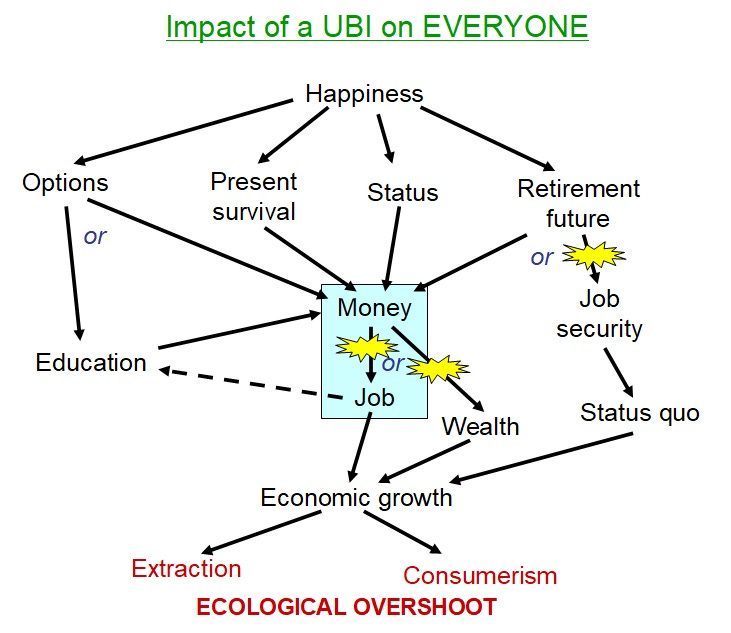Review and Reveal
Solving the Value Crisis (and, by the way, Ecological Overshoot) - a review of what we've covered so far, and a reveal of my proposed tool.
[This article is part 3 of a 4-part series. Minimal prerequisite reading might be this and this.]
…we have to work within the existing economic framework to […] alter our societal perception of money, and time, and our purpose. […] I believe that is actually possible with a tool that […] is currently being actively considered by diverse governments at every level around the world.
Where are we now?
I hope we have established that civilization, as we know it, is facing a crisis in terms of which category of value systems we allow to take full precedence over all of our most important decisions. This is what I call the Value Crisis.
I hope we have established that, while money is not the problem, per se, the way that we treat money (as an objective rather than a tool) is the most a serious manifestation of the “More is ALWAYS Better” fallacy of the value crisis, and a critical pressure point.
I hope that we have established that our natural pursuit of happiness need not be tied to number-based values at all, but our status quo economic paradigm has made money a prerequisite for most of the components which make up our happiness, and that’s not going to change any time soon.
And I hope we have established that, for the vast majority of us, our primary source of money is a job. That work income is not only critical to our happiness, it is also essential to our very survival. Moreover, jobs are so fundamentally critical to us and to unrelenting economic growth, that every government is categorically prevented from taking really meaningful action towards any other aspect of human well-being IF such an action would critically threaten jobs.
[If you feel that any of the above assertions are flawed, please click on the associated article, identify the flaw, and comment there. I will respond to clarify or correct immediately.]
The solution to the value crisis, then, involves a massive shift in our economic paradigm—one that will have to begin with a cultural shift that also recognizes the challenge of the Value Crisis Conundrum. (That’s the idea that no one will change which value systems they are using until they see the benefits of doing so, but those benefits will not be seen or understood until they are already using that different category of value system. This is because the two categories of value systems exist as a polarity of opposites.)
My proposal, based on all of the above, is that we have to work within the existing economic framework to gradually (but as rapidly as possible) alter our societal perception of money, and time, and our purpose. That sounds massive (and in the end, it is), but I believe that is actually possible with a tool that we already have—a tool that was almost implemented in the United States 50 years ago, and is currently being actively considered by diverse governments at every level around the world.
My Number One Best Bet for a Transition Tool
Resolving the value crisis is truly a evolutionary step for human civilization. It would mean everything to our future.
After decades of research on the value crisis, refining ideas, applying the accumulated wisdom of ecological economics, and getting different whole-picture perspectives on this challenge, I am willing to put all of my eggs in one basket and state that the best tool to try at this point is…
…a Universal Basic Income.
To those of you for whom I have just triggered a series of knee-jerk responses, I’ll begin with some disclaimers:
A Universal Basic Income (UBI) itself does not solve the value crisis. It simply begins the transition possibility.
The proposal of a UBI need not include any other immediate legislated alteration to the status quo economic model. A UBI works with what we have now, and, on its own, should be sufficient to inspire the paradigm shifts required.
A UBI in an isolated economy will not initiate the resolution of the value crisis, but, if sustained, it could lead to a broader implementation of the concept. A national UBI is probably the minimum to have a meaningful impact on the value crisis.
The biggest impact of a basic income is NOT people stopping work or quitting their job. That has been proven, time and again. And it’s (obviously) not the effect I’m looking for.
The ultimate goal of a UBI is to change the economic paradigm. There are very practical answers to how such a program would initially be paid for, however, asking for a full and sustained costing under the old paradigm is like asking 40 years ago who is going to print all of the user guides for the internet. The internet doesn’t work that way. Likewise, a UBI is a game changer that completely alters the economic landscape.
What is a Universal Basic Income (UBI)?
There are a variety of ways to implement a universal basic income. The essential idea is that every citizen has the opportunity to receive a fixed sum of money from the government on a regular basis, guaranteed, no questions asked. The money would not maintain a desirable standard of living—instead, it would be the difference between destitution and a shot at survival (with dignity).
[Frankly, I prefer the term “guaranteed living allowance”, for reasons given here, but I will stick to the term “basic income” for clarity.]
Let’s begin with the diagram of dependencies that we introduced in Step 1, and expanded in Step 2. Firstly, if we accept that our current society still demands money in order to satisfy the components of happiness (for now), and our present sources are either a job or independent wealth, then a UBI would be an alternate source for that money. It does not mean that people would stop working. It means that a job (or independent wealth) would no longer be a human imperative.

Secondly, one of our greatest continuous life stressors—Retirement Future (i.e. do we have enough money for our future when we are old or no longer able to work?)—is eliminated. We still desire job security, we still save for our retirement, but we do so knowing that if all else fails, there will be a basic income in our future to fall back on.
A universal basic income is a safety net, not a lounge chair.
Why a UBI?
There are a great many benefits from a UBI to consider—enough that I will leave most of them to a final (Part 4) post in this little mini-series. Right now, I want to focus on my reason for introducing the concept now—as a possible solution to the value crisis.
The first reason is for every person to question the present connections between happiness and economic growth. If the latter is no longer necessary for the former, then we have the possibility of people and communities daring to begin to start considering the alternatives to our destructive (and, frankly, suicidal) status quo.
The second reason is to sever the connection between a job and human survival. If a very basic safety net is available to everyone, then governments and other change-makers have a lot more leeway to take actions that will undoubtedly have short-term impacts on employment prospects.
The third reason is to revitalize qualitative human values like beauty, connection, creativity, entrepreneurship, dignity, and craftsmanship. If basic survival and an ability to afford the essentials of life becomes a given, it is predicted that people might begin to consider their purpose in a different light. They might spend more time on esthetic values, take more risks, exercise more flexibility with their time, experience significantly less stress, and enjoy life more. I will go into details in Part 4.
The fourth reason is that a UBI circumvents the Value Crisis Conundrum. It doesn’t feel like you are giving anything up or leaving the number-based value system. After all, a universal basic income looks like free money, right? However, by making essential survival income a right, a gift, and a universal non-issue, the benefit conveyed by that number-based value becomes diminished just enough that there’s great potential for communities to give more precedence to other (human) values.
The fifth reason is basic incomes are proven strategies that are already being debated in governments worldwide. We already have pseudo-basic-income programs for various populations. Those, and multiple pilot programs, have proven that they are effective tools for improving livelihoods and reducing net public sector costs. The major realization that is missing is that a UBI is not just a poverty eradication tool. That is how it’s viewed and promoted in every debate, but the reality is that a universal basic income can shift our entire economic paradigm and maybe even lead to a practical solution to the value crisis.
That’s huge.





My fear is that UBI will be used to help usher in huge layoffs due to job automation and this will lead to a"dual economy" where some people will be part of the formal economy and others will be relegated to the informal economy. Just as the "gig economy" is not actually beneficial to most workers, the UBI, as you mentioned, will not actually support a desirable life. People will lose their homes and UBI will just prevent people from starving, not prevent grinding poverty. I don't see a miserly UBI preventing people from demanding decent jobs from their governments. A basic safety net, at minimum, should provide for a safe, permanent home - even fully employed people in many countries struggle to access that basic need.
Universal Basic Income needs to be "proven" in another state before it would be considered seriously in North America. It would not come from enlightened planning based on what I can see in the world. It would take extraordinary chaos before it will be tried on a grand scale. Could it be adopted at the local level or provincial level? In other words, where's the most like place for this be tried?